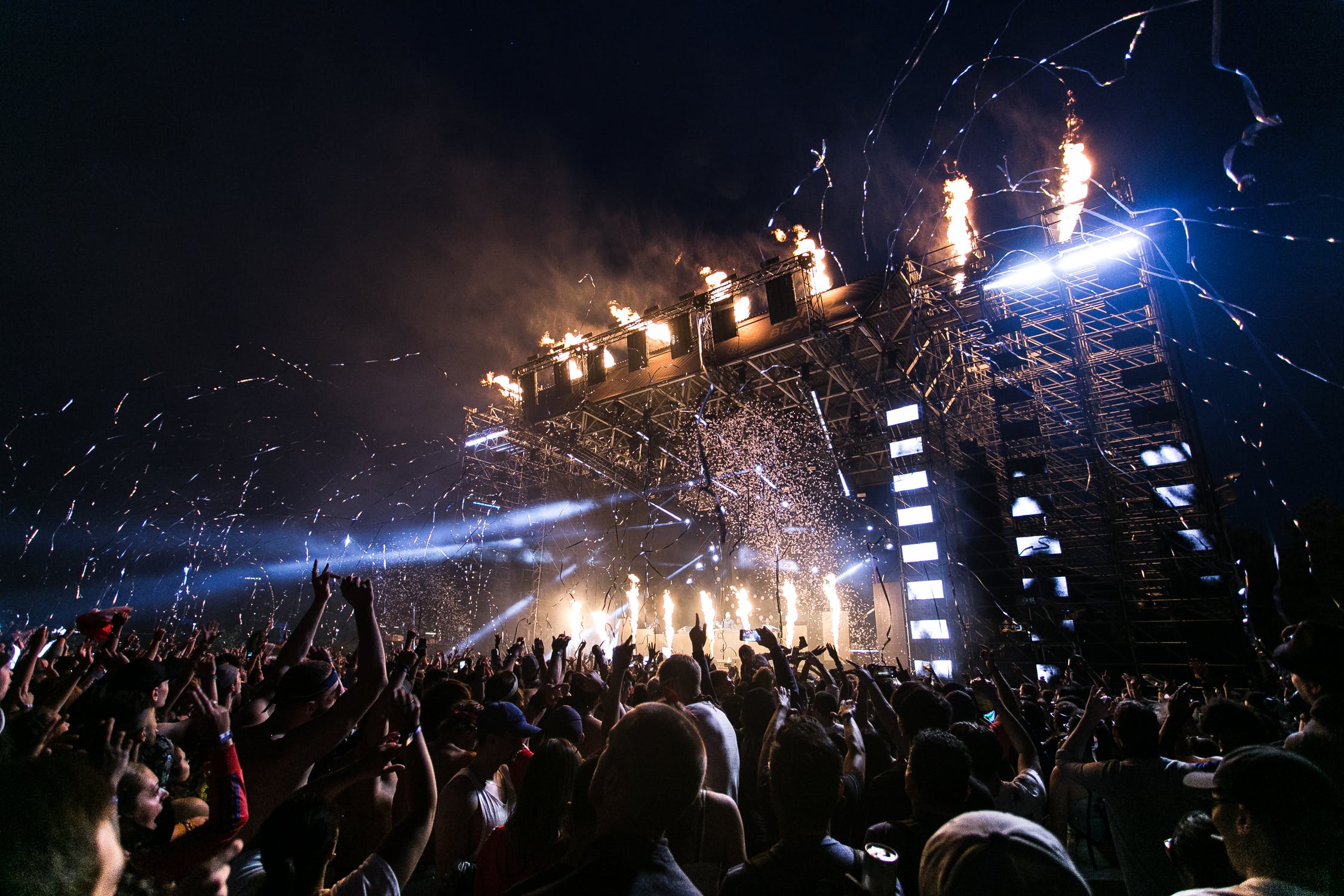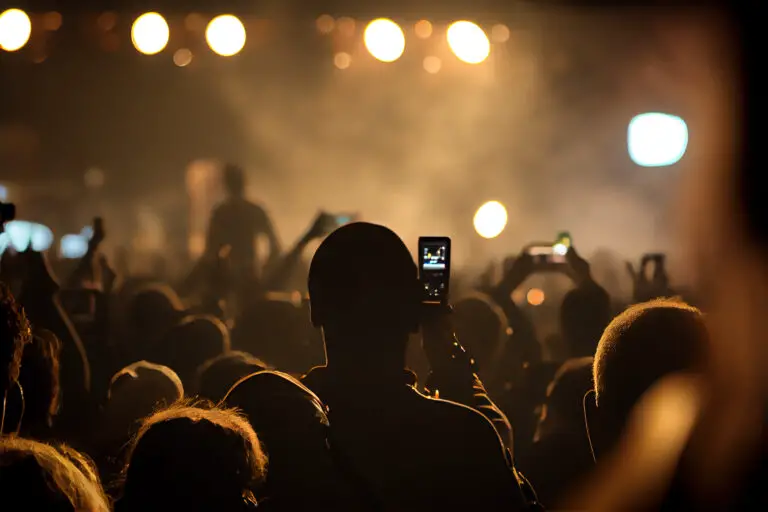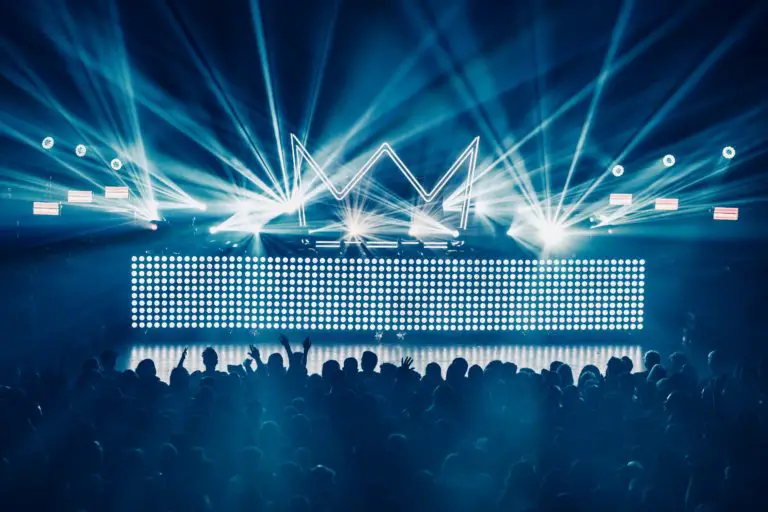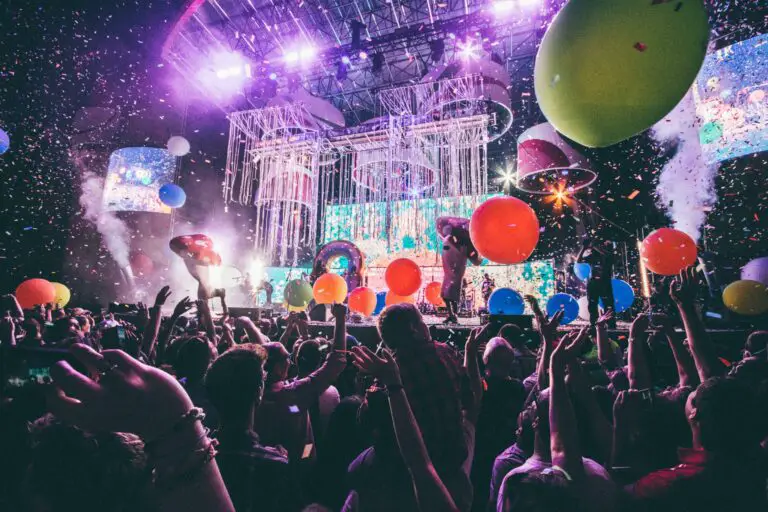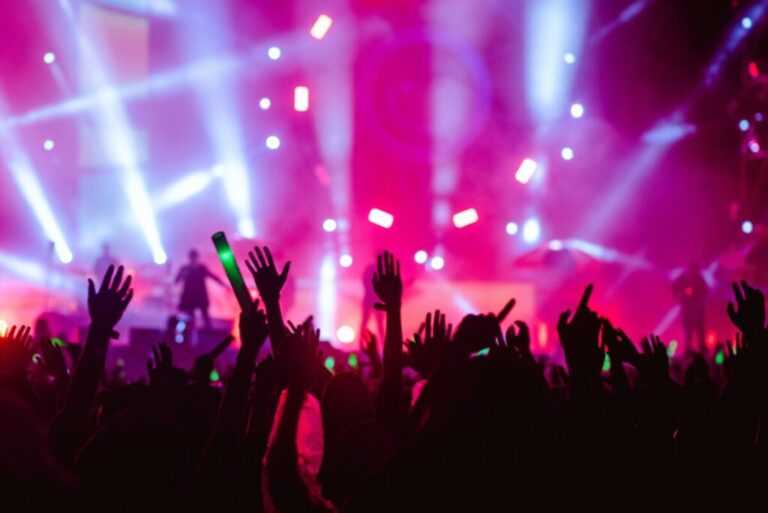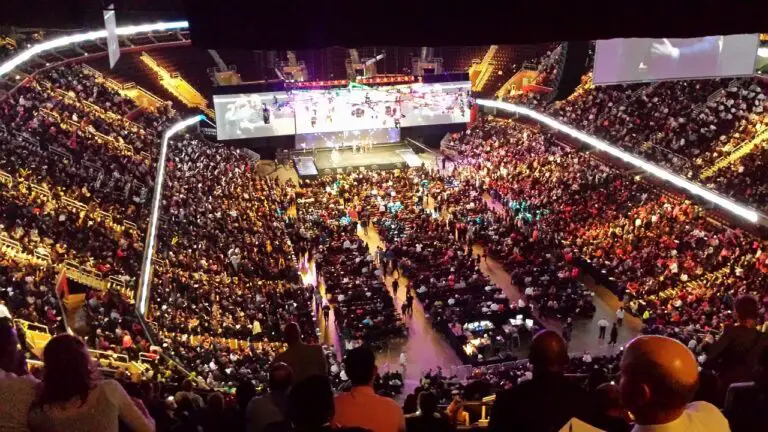How Long Do Concerts Last? Things To Know For Your Next Show
When the audience is screaming, and guitar riffs pierce the air like lightning, it’s easy to lose track of time. Time loses all meaning when you’re going to a concert. But, if you have something to do, you might struggle with the decision of leaving early or canceling your plans.. Naturally, you might wonder…. how long do concerts last?
In short: The full length of an average concert is 5 hours. This includes when you first get into line, buy your ticket, find your seat, enjoy the experience, and leave the venue.
The length of the concert you go to varies, but it’s best to overestimate the time you’ll spend there. If you’ve got a commitment or want to get home before dock, assuming you have less time won’t disappoint you if you lose that time.
In this article, we’ll dive into the exact factors that contribute to concert length, and offer some tips on what you can do to better prepare for a long show.
What Affects Concert Length?
Concert length changes depending on several factors. This includes…
- Encores
- Tour flexibility
- Performer count
- Setlist length
- Stamina
- Local curfews
- Genres
- The equipment needed
- Type of concert
- Other factors
Below, you’ll learn more about how the length of a concert can change depending on what’s above.
10 Ways Concerts Can Last Longer (or Shorter)
The musical portion of a concert can last 90 minutes to several hours depending on these factors.
1. Encores
A concert will last longer depending on the demand of the audience to hear more music. The “encore” chant at the end of a show is a demand for more music, adding at least 20 minutes to the show.
An encore typically happens when bands play one extra song on top of their regular setlist. This is usually an older, more popular song that people know, but might be a sample from an upcoming album.
2. Tour flexibility
A concert might ask for an additional 30 minutes to an hour (or more) depending on the other concerts on tour. If a band has an engagement tomorrow, they need more time to rest.
If a band doesn’t have an event tomorrow, the length of the show could be longer. Musicians might choose to hang out and continue to play, especially when they first start and don’t have as many tour obligations.
3. Performer count
A small, single-band concert differs from a show with several musicians. The more performers you have, the longer a show can last. Here are some potential scenarios:
- A single band or musician might last up to one hour
- A local band alongside a headlining act can last anywhere from an hour and a half to three hours
- Multiple bands (up to five) can last up to four and five hours
- A music festival with more than ten bands can last up to ten hours (it also have multiple stages to host these bands)
Each performer has their own setlists, stamina needs, and tour schedules. Pay attention to the bands involved to get a better estimate on the average length of a concert.
Headliners typically command the most, but they need opening acts to fill in the slots and draw more of a local crowd. Check out our article on So what is an opening act, and why do bands have them for more information.
4. Setlist length
The setlist includes the entire list of songs that a band plans on playing at any music venue. Bands with longer histories and more music typically have longer setlists, as they have a larger body of music to draw from.
For example, the Grateful Dead played for 5 hours at the Bickershaw Festival in 1973. Post-punk British band The Cure is famous for having concerts of 40+ songs that routinely last over four hours. Bruce Springsteen, Led Zeppelin, and Manowar also put on ridiculously long shows. Of course, these artists have enough successful songs to fill copious amounts of time.
Some artists don’t have enough songs to fill that much time. Even a conservative 90-minute concert requires more than an hour of high-quality music, which isn’t easy to pull off.
5. Stamina
A band’s stamina is affected by factors that include physical fitness, age, and health conditions. If a band has less stamina, it might decide to have shorter concerts.
But passion can trump age.
Earlier this year, Ozzy Osbourne rejected the idea of retirement. The legendary artist shared the following in a Los Angeles Times article:
“I’m f— not dying. Come on guys, haven’t I had it bad enough already? If I get the OK today, if the doctor said to me today, ‘Oh, you can tour,’ it would take another six months to get it to go, you know?”
There’s no guarantee that Ozzy will come back, but there’s a clear passion that can overcome stamina. In fact, you’ll find that some older performers keep going, although you might see fewer stage dives from them.
6. Local curfews
On average, concerts will end around 10 or 11 pm. However, venues in places with noise ordinances might be subject to local curfews.
Local curfews can end concerts by about 8 or 9 pm, shaving off up to three hours from a band’s willingness to go further. You’ll find that the average concert length in these areas is going to be much shorter.
7. Genre
Concerts are longer or shorter depending on the type of musical genre. This is because those genres differ on the length of music that they play.
An average rock concert might have an average song length of up to four minutes. But if you decide to go to a Tool concert, songs can last up to 12 minutes, which means the shows will usually last longer.
Meanwhile, punk concerts might last shorter because many punk bands have incredibly short songs. These shorter songs can affect how long a concert lasts, but bands with longer setlists can supplement this with more songs.
Genres also affect the equipment needed.
8. The equipment needed
Concerts often take longer, depending on the time needed to set up. The more equipment you bring in, the longer it takes to set up, creating a longer intermission while you’re waiting for the next band.
Acoustic bands typically have shorter setup times, as they have less equipment. That time can be drastically shorter if it’s a single acoustic musician.
If a band brings all of their equipment with them everywhere, it will take more time. Meanwhile, some bands can rely on the equipment already there, using a venue’s provided speaker system and instruments.
9. Type of concert
Many concerts last an hour while others might last all day. This will depend on the type of concert, which might change depending on the genre and other factors.
Festivals, which feature many bands and a few headliners, will take the longest. Meanwhile, musicians that play at a bar might only last a few hours.
Classical concerts differ in that they don’t have many bands, but they play multiple classic pieces and might have more intermissions. Live music comes in many forms, and those forms can take longer than expected depending on even more issues.
10. Other factors
While a concert can last longer, depending on how many bands play and the popularity of the headliner, there are other factors that might affect this.
A guitarist or drummer might decide to include a random solo. An impressive drum solo can last for several minutes, adding up to 17 minutes to a live show. Here’s an example of that baffling solo:
The headlining act gets a bigger time slot — bands and artists with extensive music portfolios filled with successful songs last the longest. Opening bands and one-hit-wonder artists have shorter concert sets due to reduced demand for their other songs.
An actual concert can also end abruptly depending on how the fans behave. If a musician’s fans flood the stage with garbage and bottles, bands have been known to end concerts abruptly, regardless of the potential of ticket refunds.
When to show up to a concert – Setlist vs setup
If you’re there only for the headliner, you could show up 30 minutes into when the doors open. Otherwise, if you’re there for the whole thing, showing up an hour earlier is preferred.
Concert length covers everything from when the doors open until every band and audience member has departed. However, there’s a lot of stuff happening during this period outside of musical performances.
A 5 hour set, like what the Grateful Dead pulled off in 1973, is an anomaly. But that 5 hours doesn’t include the hours leading up to the show, changeovers between acts, and other lengthy components. These extras can add several hours to a concert’s length.
Thus, while a 5 hour set is exceptionally lengthy, a 5 hour concert is the norm.
Here are some concert elements that add up quickly:
- Doors open before opening acts — 60-90 minutes
- Opening acts — usually 30 minutes each
- Changeovers in between acts — also 20-30 minutes each
- Headline act — 1 to 2 hours
- Departing — 15 to 30 minutes
Let’s say you go to a concert for your favorite artist. You enter as soon as the doors open. However, it takes an hour for the opening act to finish setting up as everyone waits for stragglers to arrive. Then, the opening act performs for 30 minutes. It takes another 30 minutes to swap out stage equipment for the headline band.
Next, the headline act performs for an hour before taking a 15 minute break. They go for another hour, but that hour turns into an hour and 15 minutes as the audience demands encores.
The concert is now over, but you still need to get out of there. There are hundreds of people trying to leave at the same time, so it takes you another 30 minutes to get to your car and exit the lot.
In total, you spent 5 hours from entering the stadium to leaving the parking lot — even though the main set only lasted 2 hours — and that’s only assuming one opening act!
What time do concerts usually start?
Most of the time, concert doors will open between 6 and 8 PM. This gives people driving from out of town some time to get off work and head to the venue. However, the official start time on the ticket rarely corresponds with when the band or artists starts playing their setlist.
Consequently, you should probably stay away from concerts if you need to get up early the following day. Start times can be between 30 minutes to a few hours after letting fans in. To be safe, take the time it says on your concert ticket and add two hours. This gives the opening act time to finish and the leading artist to start performing.
What time do concerts end? What affects when concerts usually end?
Concerts usually end around 11 pm, with earlier or later times depending on the tour flexibility and the request for encores. But each concert differs, and it’s more about the musical experience. Below are some factors that impact when concerts end:
Improvisation
Some concerts follow a structured format, adhering to a predetermined setlist that spans a particular length of time. These shows often conclude with a crowd-pleasing song or a powerful performance that leaves attendees buzzing with excitement. However, other concerts embrace spontaneity and improvisation, allowing artists to extend the show until they feel it’s the perfect moment to bid farewell.
Tour flexibility
For concerts that are part of a scheduled tour, you can usually rely on sites like Setlist.fm to give you a could idea of when the show starts and ends, however every venue can be a bit different. Some venues are in neighborhoods with strict sound ordinances requiring shows to end at 10PM or 11PM, whereas others could go late into the night without a care.
Venue requirements
Some bands are required to end a concert at a certain time so the venue can clean up and clear out. Machine Gun Kelly felt the sting of this, being fined nearly $300 thousand for going over the scheduled limit. At the very least, going over the limit can cause the staff to give you some dirty looks.
What was the longest concert ever?
The longest concert ever isn’t even done yet. Avant-garde musician John Cage wrote an organ piece called “As Slow as Possible” in 1987. The performance began in 2001 in Germany’s St. Burchardi Church and isn’t expected to end until 2640. Chord changes happen about once every two years.
Here are some honorable mentions:
Chilly Gonzales, a classical/rap/pop/alternative musician from Canada, played for a jaw-dropping 27 hours in Paris in 2009. Wondering how he ate, got changed, and attended to his hygiene? Don’t worry; he worked all that into his performance. He shaved, ate cereal, and slipped into his night clothes while keeping a hand on the piano.
Dkuzhalmannam Ramakrishnan, an Indian musician, set the Guinness World Record in 2009 for the longest solo concert ever. The insanity lasted 501 hours, or more than 20 straight days. He accomplished this feat by hand-drumming at the Rhythm Therapy Hall in Kerala, India.
How Long Do Music Festivals Last?
Unlike concerts, the runtimes of music festivals are best measured in days. This is because music festivals allot time for several shows across multiple stages on different dates. Like concerts, how long musical festivals last depends on many variables.
Generally, music festivals last between one day and three weeks. The majority of music festivals are on the shorter end of that. Three days gives most festivals plenty of time to draw in massive crowds and plenty of bands. It’s also far cheaper to throw a music festival for a few days than a few weeks.
FAQs
What Should I Bring to a Concert?
Here are a list of items you should bring to a music concert
- Sunglasses and sunscreen for outdoor events.
- Earplugs to protect your ears. Concerts are loud, ranging between 110 and 140 decibels.
- Appropriate clothes based on the weather forecast
- Cash because food, drinks, and merch cost money
- Identification if you plan to buy alcohol
- A designated driver for the same reason above
- A clear bag is usually required for bands, but check the concert rules.
How Early Should I Arrive at a Concert?
If you have a reserved seat, arrive at least 20 minutes earlier. Otherwise, you’ll want to arrive up to two hours earlier so you can get a good spot.

